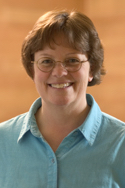
In Spring Term 2019, Hudson Kennedy, Nicole Moore, and Damon Solomos in Professor Kimberly Jensen’s Women in Oregon History class at Western Oregon University interviewed Ms. Linda Long about the Nineteenth Amendment centenary and the importance of the vote. Linda Long is the Curator of Manuscripts and a Senior Librarian at the University of Oregon’s Knight Library. A researcher and archivist, she has been published in many archival and history journals. She earned a BA in History at Seattle University, earned a Masters in Archives Administration and History from Case Western University, and earned a second Masters in Librarianship from Brigham Young University. In her view the ability to vote gives people a voice to determine their own future. She also discusses how women continued to be active in promoting legislation for social justice after achieving the vote.
Q: In your view, why is voting important?
Ms. Long: The right to vote means that each adult person can be a full citizen of a state or country. Without the right to vote, individuals who are not enfranchised don’t have a say in the laws or statutes that govern them. The ability to vote gives each person an equal voice to manage their own living space and their destiny.
Q: What barriers to voting have some Oregon women experienced?
Ms. Long: Even with the passage of woman suffrage in Oregon in 1912, some women (and men) still could not vote. African Americans could not be legal citizens of Oregon, and Native Americans, Asian Americans and others could not vote for reasons other than sex.
Sexism and misogyny did not disappear from Oregon culture (after 1912) and from American culture (after 1920). There were roadblocks for women, which were embedded into our culture in the form of misogyny (ingrained prejudice against women) and sexism (stereotyping, or discrimination, typically against women, on the basis of sex).
There were more struggles for women as they began the effort to attain equal rights with men. In the late 1960s and 1970s in Oregon, the women working with the Oregon Women’s Political Caucus (OWPC) helped elect women to school boards, city and county government positions, and to the Oregon Legislative Assembly. The OWPC created a “Campaign School” to teach women how to run successful political campaigns. The OWPC was enormously successful and today women are elected to these positions in the normal course of events.
Q: How have some women used the vote as a tool for social change?
Ms. Long: See above, but also women used the vote to enact more legislation for social justice. As I understand it, there were many individual laws passed that protected women and children. When the effort to pass the ERA began in earnest in the 1970s, many women were afraid that these individual laws that protected women would then be nullified by the federal amendment. I’m sorry I don’t have particular examples of the various laws that were passed targeted specifically to protect women and children.
Q: What additional points do you feel are important for us to consider as we commemorate the ratification of the Nineteenth Amendment?
Ms. Long: Generally, the struggle for women’s rights and the effort to fight sexism and misogyny continues in the United States (as it does all over the world). For examples, we simply have to look at our present presidential administration and to news stories that highlight that women are often forgotten or dismissed. One example in recent news is the story of the woman astronaut who was prepared and eager to walk in space at the Space Station but couldn’t because NASA (National Aeronautics and Space Administration) didn’t think ahead and allocate money to create a space suit that was small enough to fit her.
The Civil Rights Act of 1964 included the word “sex” in the legislation, which originally only included race, color, religion, and national origin. Still, we can see that we needed the women’s movement of the late twentieth century to help improve laws and elevate awareness of discrimination against women.
